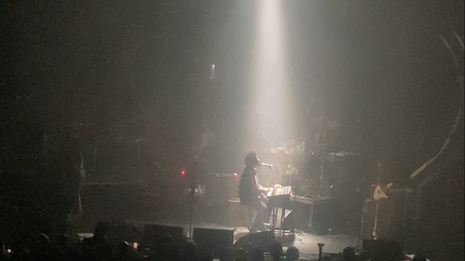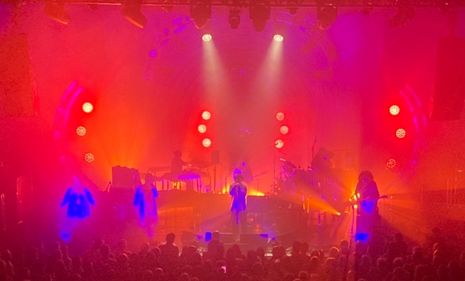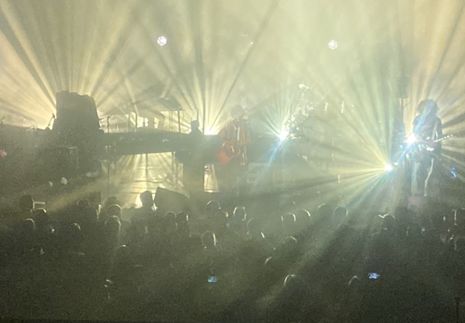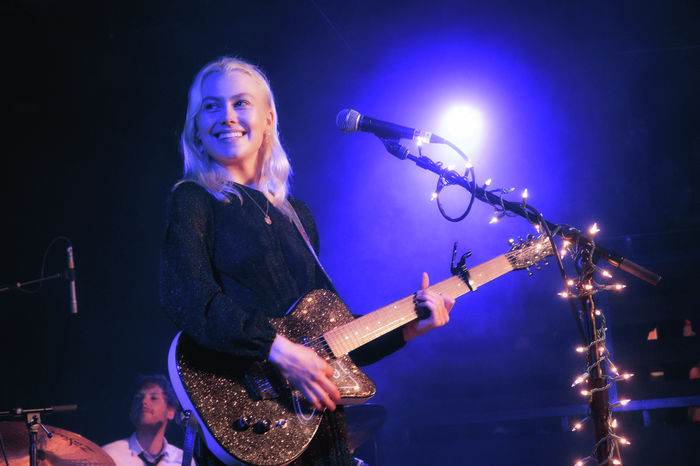Michael Kiwanuka live at the Corn Exchange review
Editor Jacob Tucker reviews the musical and technical aspects of the soul artist’s most recent Cambridge performance

British singer-songwriter Michael Kiwanuka’s recent performance at the Corn Exchange made for a night to remember. He’s been in the industry for quite a while. He supported Adele during her 2011 tour; in 2012 his debut, Home Again, peaked at number four in the UK charts; the follow up, Love and Hate, reached number one, and his last LP, the fantastic KIWANUKA, has been gold-certified. Kiwanuka has a large base of fans in Cambridge, too: after performing the first few songs from his carefully chosen set, Kiwanuka thanked the audience for waiting over two and a half years for him to return to our city. The format and venue allowed Kiwanuka to reiterate his studio-produced songs, arguably for the better, with a lot of in-person charm and a supportive crowd. However, while this review will inevitably revolve around Kiwanuka himself, bear in mind that the performance took form in a seven-piece band: alongside Kiwanuka on main vocal and backup electric guitar, the lineup featured Steve Pringle on keyboards, Michael Jablonka on lead guitar, Alex Bonfanti on bass, Graham Godfrey on drums, and – leaving perhaps the best for last – Emily Holligan and Simone Richards on mesmerising backing vocals.
“Michael Kiwanuka and his band prove themselves to be just as musically talented, if not more so, performing live as they are on studio albums”

Musically, Kiwanuka’s show demonstrated his musical talent just as well as his albums do. Every song was performed according to the same arrangement he used for his studio released, and no significant improvements were therefore made to the music itself. However, this was not a disappointment, and harks back to the old adage, If it ain’t broke, don’t fix it. Kiwanuka’s pre-written material formed a perfect backbone for a live show that expounded past the music in other respects: with one or two hiccups, the lighting apparatus in the Corn Exchange was used almost perfectly, capturing the mood of each song and allowing for a lot of flair on the dramatic cuts; the set-list was well organised, too, and the transitions from one song to the next never felt jarring.
The crowd had been my main point of contention before going: it’s always hard to tell whether they’ll be too rowdy for the music or vice versa, and this can sometimes unfairly stunt an otherwise great performance. Kiwanuka’s crowd, however, suited the vibe of the music perfectly, almost melding into it at points, and allowed the talent on stage to shine through even more brightly.
Perhaps the most curious part of the concert was Kiwanuka’s use of encore: after initially "finishing", a protracted wave of applause rose up, intermingled with cries for the band to continue playing. They came out onto the stage again, but, unlike any other encore I’ve seen live before, the group played another seven songs before finally disappearing again, this time permanently. It was an interesting way to prolong the show, and I’m still not entirely sure how to interpret it. There were some fairly deep cuts from the Kiwanuka catalogue mingled in the encore, so it clearly wasn’t an attempt to play the familiar greats. Nor was the audience begging for such a grand extension. It had been a great show, but there was certainly a disconnect between Kiwanuka’s interpretation of the crowd and the lack of rousing desire for such a lengthy encore. The first support act, Wild Front, was rather tedious, and the lead singer’s habit of mumbling into the microphone meant that the only way of determining the band’s name was to read it hastily scratched on the face of their bass drum. However, Tawiah, the second support, made up for this in droves.

Overall, the concert was a great experience: it was generally well-orchestrated, had some genuinely staggering musical high-points, and was able to bring a massive crowd together with ease. Michael Kiwanuka and his band prove themselves to be just as musically talented, if not more so, performing live as they are on studio albums, and I would wholeheartedly recommend catching them on tour.
 News / CUP announces funding scheme for under-represented academics19 December 2025
News / CUP announces funding scheme for under-represented academics19 December 2025 News / Cambridge welcomes UK rejoining the Erasmus scheme20 December 2025
News / Cambridge welcomes UK rejoining the Erasmus scheme20 December 2025 Comment / Yes, I’m brown – but I have more important things to say22 December 2025
Comment / Yes, I’m brown – but I have more important things to say22 December 2025 News / SU reluctantly registers controversial women’s soc18 December 2025
News / SU reluctantly registers controversial women’s soc18 December 2025 Film & TV / Timothée Chalamet and the era-fication of film marketing21 December 2025
Film & TV / Timothée Chalamet and the era-fication of film marketing21 December 2025









